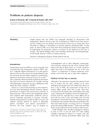Search
for
Sort by
Research
30-60 / 1000+ results
research Guidelines on the Use of Finasteride in Androgenetic Alopecia
Taking 1 mg of finasteride daily can increase hair count and improve hair appearance, but it may have side effects on sexual function and a potential risk of prostate cancer. It may not be effective for postmenopausal women unless taken in higher doses.

research Androgens and Hair Growth
Androgens can both increase and decrease hair growth in different parts of the body.

research The Hair Follicle as an Estrogen Target and Source
Estrogens significantly influence hair growth by interacting with receptors in hair follicles and may help regulate the hair growth cycle.

research Prolactin and the Skin: A Dermatological Perspective on an Ancient Pleiotropic Peptide Hormone
Prolactin affects hair growth and skin conditions, and could be a target for new skin disease treatments.

research Androgenetic Alopecia: Causes, Diagnosis, and Treatment Options
Hair loss from genetics and hormones can be treated with drugs or surgery.
research Animal and In Vitro Models for the Study of Hair Follicles
Understanding hair follicles through various models can help develop new treatments for hair disorders.

research Minoxidil: Mechanisms of Action on Hair Growth
Minoxidil boosts hair growth by opening potassium channels and increasing cell activity.

research Trans-Species Hair Growth Induction by Human Hair Follicle Dermal Papillae
Human hair follicle cells can grow hair when put into mouse skin if they stay in contact with mouse cells.

research Androgenetic Alopecia: An Update
Minoxidil and finasteride effectively treat hair loss.

research Frontal Fibrosing Alopecia in Postmenopausal Women
Some postmenopausal women with frontal fibrosing alopecia stopped losing hair with finasteride treatment, hinting at a possible hormonal cause.

research Challenges in Diagnosing Female Pattern Hair Loss
Female pattern hair loss diagnosis is challenging and should use dermoscopy and histopathology instead of pattern recognition, as hormones may not always be the cause.

research Androgenetic Alopecia: Clinical Features, Classification, and Treatments
Male pattern hair loss is genetic and influenced by hormones, with treatments like minoxidil and surgery available.

research Physiopathology and Current Treatments of Androgenetic Alopecia: Going Beyond Androgens and Anti-Androgens
Hair loss treatments work better with lifestyle changes.

research Ketoconazole as an Adjunct to Finasteride in the Treatment of Androgenetic Alopecia in Men
Ketoconazole shampoo with finasteride improves hair density in men with hair loss.

research New Drugs Under Investigation for the Treatment of Alopecias
New treatments for hair loss show promise, but more research is needed to confirm their safety and effectiveness.

research Role and Mechanisms of Phytochemicals in Hair Growth and Health
Natural products and phytochemicals may help with hair regrowth, but more research is needed.

research Autistic-Undisciplined Thinking in the Practice of Medical Trichology
The article concludes that treating hair loss requires careful research, understanding the causes, and personalized treatment plans.

research Clinical And Preclinical Approach In AGA Treatment: A Review Of Current And New Therapies In The Regenerative Field
New regenerative therapies show promise for treating hair loss.
research Hormonal and Genetic Etiology of Male Androgenetic Alopecia

research Cutaneous Androgen Metabolism: Basic Research And Clinical Perspectives
Creating stronger blockers for skin enzymes might lead to better treatment for conditions like acne and excessive hair growth.

research Managing Cutaneous Manifestations of Hyperandrogenic Disorders
Birth control pills help treat skin and hair growth problems linked to high male hormone levels.

research Hair Problems in Women: A 1997 Study on Prevalence, Psychological Impact, and Treatment Approaches
Hair problems are common and distressing for women, but increasing knowledge of treatments offers hope.

research Alopecia: Managing the Basics
The document concludes that treatments for female hair loss and excess body hair are available, but managing expectations is important.

research Hirsuties
Hirsutism in women is often due to hormone sensitivity and has significant psychological effects.

research Role of 5α-Reductase in Health and Disease
5α-reductase is essential for male sexual development and its inhibitors have potential in treating various conditions related to hormone action.

research Hair Follicles and Associated Glands as Androgen Targets
Androgens like testosterone affect hair growth and oil production differently across body parts and individuals.

research The Distribution of Estrogen Receptor Beta Is Distinct to That of Estrogen Receptor Alpha and the Androgen Receptor in Human Skin and the Pilosebaceous Unit
Estrogen Receptor ß (ERß) is the main hormone controller in human skin and hair follicles, not Estrogen Receptor α (ERα) or the Androgen Receptor (AR).

research Culture of the Human Pilosebaceous Unit, Hair Follicle, and Sebaceous Gland
The article concludes that developing in vitro models for human hair structures is important for research and reducing animal testing, but there are challenges like obtaining suitable samples and the models' limitations.

research Prolactin: An Emerging Force Along the Cutaneous–Endocrine Axis
Prolactin may play a significant role in skin and hair health and could be a target for treating skin and hair disorders.